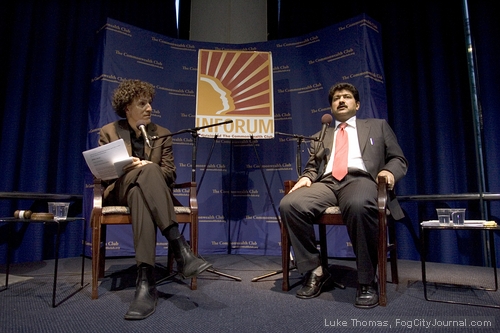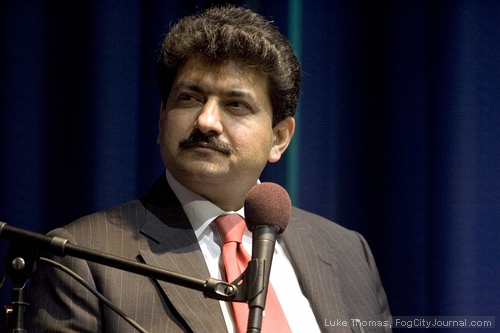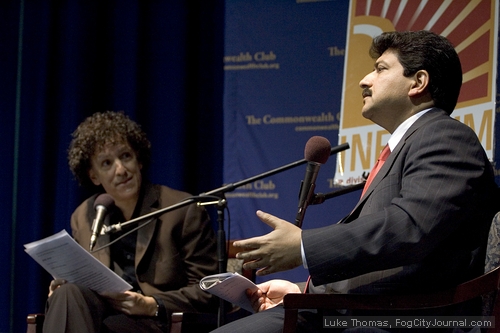
Journalist Hamid Mir discussed US foreign policy in Pakistan
with San Francisco Chronicle scribe Jonathon Curiel
Wednesday at the Commonwealth Club in San Francisco.
Photos by Luke Thomas
By Fanny Dassie
April 3, 2009
As Pakistan makes headlines with a new suicide attack targeting a mosque in the north western part of the country, the Commonwealth Club in San Francisco held a discussion Wednesday with prominent Pakistani investigative journalist Hamid Mir to discuss US policy in Pakistan and what it is like to be a journalist in the most tumultuous region in the world.
Mir, best known for being the sole journalist to have interviewed Osama Bin Laden following the 9/11 attacks in 2001, rejected top adviser to the US Central Command David Kilcullen’s claim that inaction in Pakistan would lead to the collapse of the country within six months.
“I don’t agree with that,” Mir said. “No doubt Pakistan is facing the problem of militancy. Pakistan is facing the problem of extremism, but this problem is confined only to some troubled areas which are on the border of Afghanistan,” adding that the area as “politically isolated.”
Pakistan, which became an independent state in 1947, has seen a rise in suicide attacks in the troubled north western part of the country and in its capital, Islamabad, over the past two years, attacks that are suspected to have been perpetrated by the Taliban.
In response, the US government, sorely disappointed by the Pakistani government’s inability to crush the Taliban insurgency, has launched drone missile strikes into the region since last year.
Mir expressed concerns that the drone aircraft attacks, which he said indiscriminately killed more civilians than suspected insurgents, are only reinforcing anti-American sentiment, strengthening terrorist positions and are not serving the purpose of defeating extremism.
The drone attacks have become an American problem because they are “creating more hatred against the United States of America,” he said, while also criticizing the Obama administration’s continuation of the former Bush policy in the troubled region.
“Unfortunately, Mr Obama is following the footsteps of George W. Bush,” he said. “I think Mr Obama should reconsider his policies because these policies have never produced positive results in the past and these policies will not produce any positive results in the future.”

Hamid Mir
Mir stressed the need to differentiate the Taliban from Al Qaeda. He said both groups have a common enemy but, contrary to Taliban militants who have no “organizational capabilities to organize a big terrorist attack in the United States of America,” Al Qaeda is “sophisticated, well-educated, dangerous and has an international agenda.”
In the Swat region of Pakistan, Taliban militants had been closing schools for girls, as well as terrorizing and killing civilians suspected of reporting their problems to the media. Mir said pressure from media reports led to a peace agreement signed in February between the Taliban of the Swat Valley and the government.
“After the peace, I cannot say that the situation is 100 percent ideal. It is improving,” he said, citing the reopening of girl schools following the establishment of Islamic law in the region.
As an investigative journalist, Mir interviewed Al Qaeda leader Osama Bin Laden three times through arrangements made by the Taliban, the last time during the American bombing of Afghanistan in 2001. Mir said he has believed Bin Laden was behind the 9/11 attacks, though US authorities have been unable to establish a direct connection.
Contrary to what has been reported on the Internet, Mir is not the official biographer of the Saudi-born terrorist, although Bin Laden himself urged Mir to write a book about him, a book Mir said will be released later this year.
Making contact with Bin Laden is now impossible, Mir said, and believes he is still alive based on sources close to Bin Laden.
“We should not underestimate Bin Laden,” he said.
Throughout his career, Mir has exposed scandals involving high-ranking officials and has faced many threats from Pakistani security forces and the government. Former Pakistani President Pervez Musharraf threatened Mir after Mir accused him of playing a double game with the United States and extremists.
For following what he calls his “moral obligation to support honest people” and supporting independent Pakistani judges fired by Musharraf for demanding more transparency within the Pakistani intelligence agencies, Mir was banned for four months from broadcasting on his Geo TV Network. The ban was lifted following the election of President Asif Ali Zardari last year.
While the ban was in effect, he took his show “Capital Talk” to the streets of Islamabad and was greeted by 2,000 to 4,000 people, according to his estimations. Western media relayed his battle which ultimately put more pressure on Musharraf.
“I was not doing a show. Actually, I was trying to reflect public sentiment for peace and justice in Pakistan, for the rule of law,” he said, adding that only rule of law and justice can ultimately defeat terrorism.
Mir remains hopeful that the upcoming implementation of the Charter of Democracy, signed in 2006 by Zardari’s assassinated wife, Benazir Bhutto, and giving rights to the government over the troubled areas, will push the local population to seek justice from the Pakistani government instead of the Taliban.
“If there is a strong parliament in Pakistan, if there is an independent judiciary […], if there is a free model […], we can solve all the problems,” he said. “We can fight against terrorism; we can fight against extremism.”
“I am hopeful that the implementation of the Charter of Democracy will bring true democracy to Pakistan,” Mir added.



 The Hunger Site
The Hunger Site
April 5, 2009 at 8:50 am
Who is Hamid Mir?
Reading about him at the Wikipedia does not allay my suspicion that he is a cypher of value to those who wish to promote hatred against Muslims in the now played down, but continuing U.S. War on Terror.
In these past years the Commonwealth Club itself has appeared to me a tool of U.S. imperialism– promoting orthodoxies that pit us against “them”, making us fearful, and ever wiling to sacrifice.
Anyone who is familiar with the work of Elias Davidsson and David Ray Griffin is unlikely to connect Muslims with the destruction on 9/11/2001 and more likely to recognize the limited hangouts of truth promoted by the Establishment Washington Consensus,